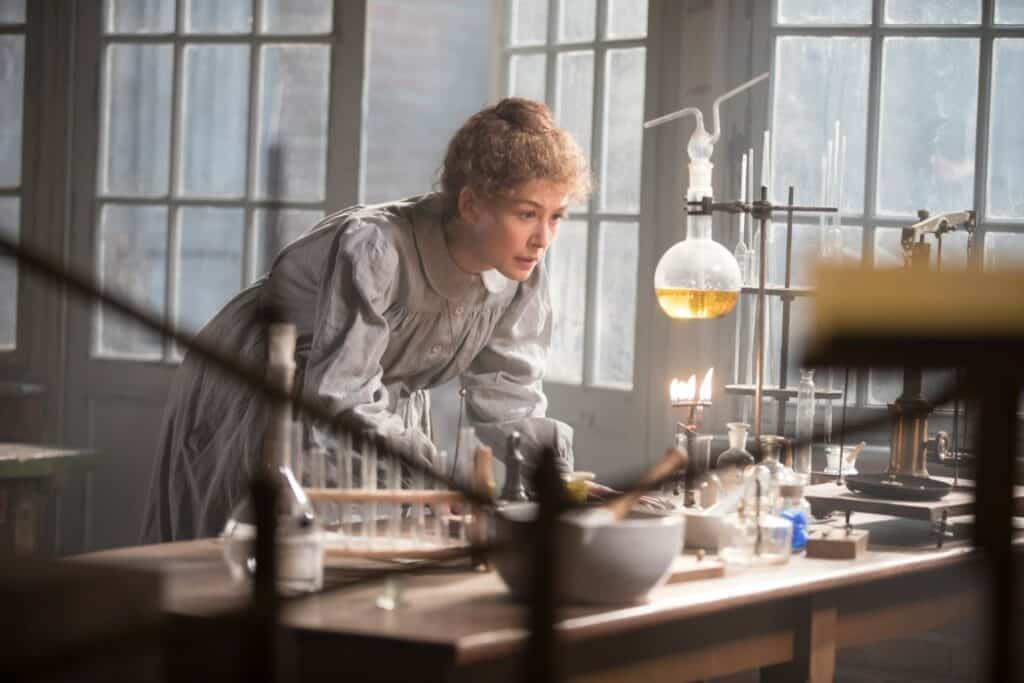Read also:
How to Watch FX Live Without CableHow To Watch AMC Without CableHow to Watch ABC Without CableHow to Watch Paramount Network Without CableMarjane Satrapi’s biopic of Marie Curie can’t cure what ails you, even with a strong Rosamund Pike turn at the center.
Paris glittering at night, a chance meeting with a handsome stranger on the street, a world perpetually bathed in the warm, fuzzy glow of the magic hour no matter the time of day—is this a sweeping tale of romance? Well, not exactly, but you’d be forgiven for making the mistake.
No, this is Marjane Satrapi’s (Persepolis) biopic of pioneering female physicist Marie Curie, Radioactive. While you might hope that the director of one of the most well-regarded animated films of the last two decades (as well as author of the graphic novel it was based on) would have a truly inventive take on the life of Marie Curie, prepare to be disappointed.
Radioactive is nothing but your standard biopic fare, falling in the footsteps of other milquetoast Oscar-bait like The Theory of Everything and The Imitation Game. Rosamund Pike (Gone Girl, Pride and Prejudice) stars as Marie and the film follows her from her first meeting with Pierre (Sam Riley) to their first Nobel Prize to her work in WWI and ultimately, to her death from radiation exposure.

Satrapi plays a little fast and loose with history here, but it’s all pretty boilerplate. The only bit of daring we see is in a series of flash-forwards that show the ways Curie’s research informed the future. Unfortunately, it’s not really clear what point Satrapi is making by including them.
Radioactive doesn’t dwell over these scenes, which include the first radiation therapy for cancer as well as global tragedies like the bombing of Hiroshima and the disaster at Chernobyl—neither of which could have occurred without Curie’s work. And it’s in that recognition that there’s truly something exciting to explore. The notion that this woman’s groundbreaking life’s work is responsible for both some of our most important medical discoveries as well as some of the worst disasters ever seen on Earth is a dichotomy worth exploring.
But the film doesn’t explore it. It merely presents the scenes and then moves on. It’s unclear what Curie thought her work could lead to. It’s also barely addressed that Curie, who by the end of her life was well aware that exposure to radiation carried serious health risks, never really publicly addressed it. Again, this avenue feels rife for drama, but it goes untouched.
Satrapi plays a little fast and loose with history here, but it’s all pretty boilerplate.
Instead, Radioactive speeds along the track, hitting all the major highs and lows of Curie’s life and spending no time on deeper reflection of that life’s work.
If it focuses on anything, its chief concern is the romance and mutual respect between Pierre and Marie. It sees Pierre’s untimely death as a Shakespearean-level tragedy. It paints Marie as successful, but also deeply unhappy without her husband, even somewhat incomplete.
But that doesn’t mean Satrapi really understands how to dramatize this, either. Most of Radioactive can be spent in a sort of pleasant, unattentive daze. Carried away by the soft, golden lighting and the bursts of Philip Glass in the soundtrack, it’s gentle, historical background noise.

Those with an interest in Marie Curie specifically might find some joy in Pike and Riley’s genuine chemistry and strong performances, but everyone else will probably be tuning in and out.
The film’s reliance on heavily-trod biopic tropes is its biggest and most disappointing failing, but they’re not so distracting as to make the film completely intolerable. It’s the sort of movie you can pluck off the shelf and know to the beat exactly what you’ll be getting. If there’s a niche audience out there hungry for soothing, overly simple British biopics, then this will fit nicely in their libraries.
Everyone else, however? They’ll have forgotten Radioactive completely before it’s even finished.
Radioactive is currently streaming on Amazon Prime Video.